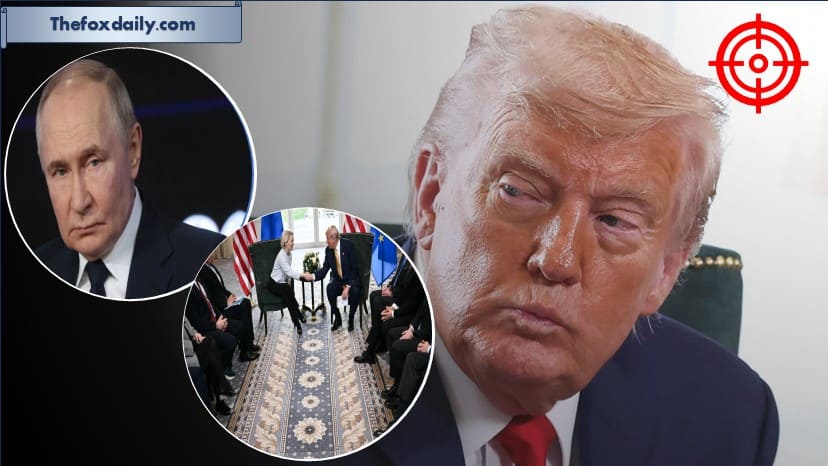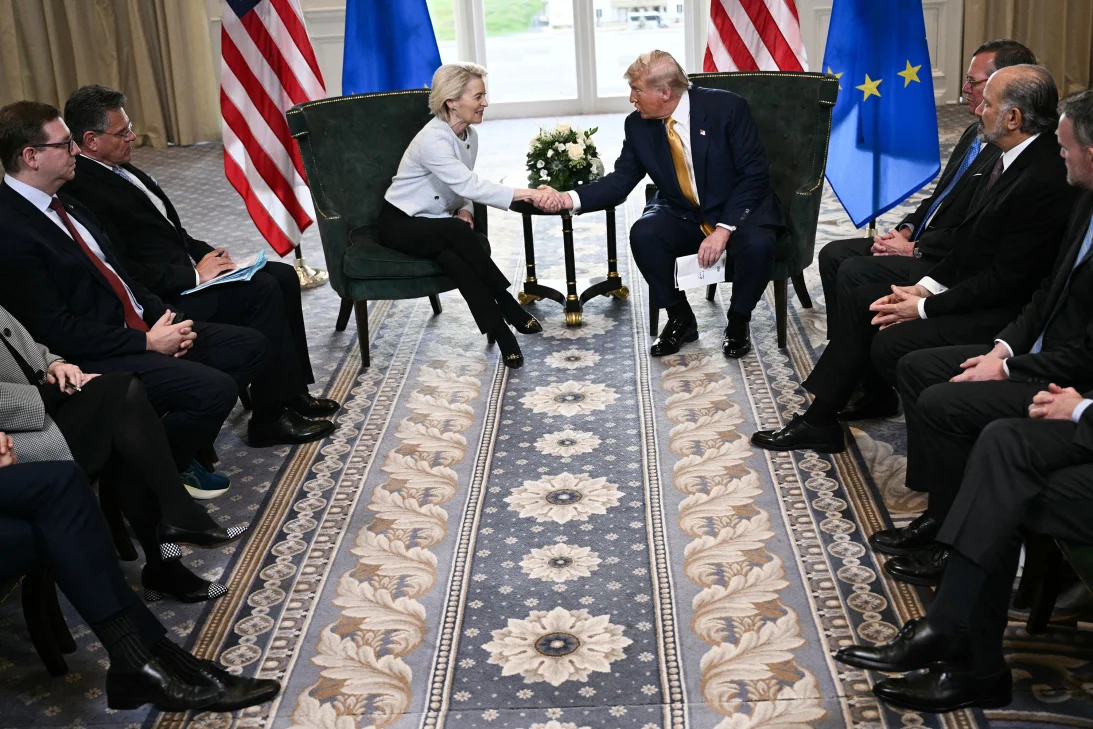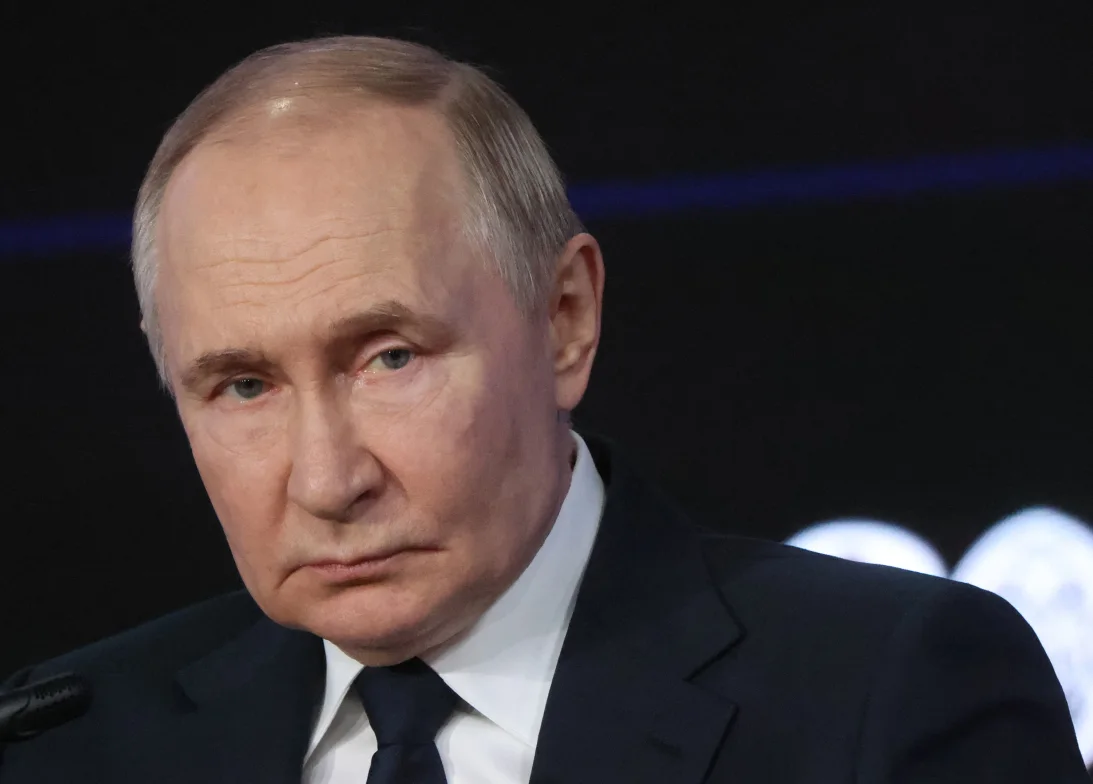
Donald Trump has the appearance of Scotland’s last monarch.
The president brought Keir Starmer to one of his Scottish golfing mansions in his mother’s ancestral homeland to the sound of bagpipes. In a corner of his own United Kingdom, the prime minister arrived by plane on Monday as a visitor and a requester.
During a mind-bending press conference, Trump covered a wide range of topics, including his distaste for wind power, Windsor Castle, and the window frames in his ballroom. Starmer was merely an extra.
In yet another brazen display of US power optics, Trump concluded his day of breaking procedure by transporting the prime minister across Scotland on Air Force One to another of his exclusive clubs.
Ursula von der Leyen, the chief EU official, matched Starmer’s ebullience the day before after arriving at Trump’s windswept Turnberry Links with a trade pact that some Europeans denounced as a capitulation.
The events in America’s new temporary capital in southwest Scotland served as a lesson in how Trump uses his unwavering personality and unrelenting ability to see people’s flaws to establish his own authority and amass significant victories.
Trump is achieving his goals on numerous fronts six months into his second term in office. By negotiating framework trade agreements that solidify one of his long-standing obsessions, tariffs, he is undermining the international free trade system. He bombarded Iran’s nuclear program with US stealth bombers all over the world. Additionally, he has pressured NATO countries to pledge a significant increase in military spending.
At home, it’s the same. Congress has been intimidated into submission by Trump. He is forcing his beliefs on prestigious universities. He is using the legal system as a weapon against his opponents and has compelled private law firms to provide pro bono legal services. Additionally, he has successfully closed the southern border and stopped illegal immigration.
He told his MAGA followers that they would reach a point where they would become weary of winning, but this type of “winning” eluded him during his first term.
However, Trump is a divisive president whose “victories” are occasionally more show than substance, so his recent run of success merits careful consideration.
On a global scale, it is reasonable to wonder if Trump is winning for the American people or for himself. Does he act like a schoolyard tough guy or is his ability to exert pressure on allies and smaller states a sign of strength? And what will be the consequence of his wins in the long term — years after his zest for a headline proclaiming a great “deal” has passed? The alliances that made the US a superpower seem especially vulnerable in this regard.
The real international trials of Trump’s authority

Trump’s handling of three crucial issues—the war in Ukraine, trade, and the heartbreaking starvation in Gaza—discussed during his trip to Scotland will demonstrate whether or not he is indeed a powerful global force.
On Monday, Trump made abrupt changes in tone about Gaza and Ukraine.
Trump disputed Israeli Prime Minister Benjamin Netanyahu’s assertion that there is no malnutrition in the enclave following months of Israeli bombardment in response to graphic footage of undernourished children in Gaza.
Trump declared, “We have to get the kids fed,” and pledged to establish food distribution facilities in order to combat the escalating famine. He did not, however, elaborate on how this might operate in a conflict zone where people have been slaughtered while waiting in line for food. Additionally, he disregarded US involvement in the assistance crisis after an Israeli program supported by Washington encountered problems that evaded UN specialists.
Trump’s dedication might be a sincere change that might help him unseat Netanyahu, a leader who has consistently rejected American pressure and harmed the president’s desire to be viewed as a broker of peace.
It’s possible that Trump was genuinely moved by the tragic footage of children in pain, as was the case following the 2017 chemical weapons attacks in Syria.
However, a president with keen political acumen would have also reasoned that he might wind up taking some of the responsibility for the tragedy if anti-Israel sentiment grew. His earlier recommendation that Gazans should emigrate to make room for the construction of a beach resort known as the “Middle East Riviera” lends credence to the cynic’s argument. Additionally, Trump’s dismantling of USAID means that the children in Gaza who are dying are not alone.
Will Trump abide by his criticism of Putin?

Trump’s global dominance will be put to the test a second time over Ukraine.
The president reduced his earlier 50-day deadline for action to 10 or 12 days on Monday, expressing his mounting annoyance at Russian President Vladimir Putin’s rejection of his liberal proposals for a peace agreement in Ukraine.
“We have such pleasant, courteous, and pleasant chats. The next night, individuals pass away,” Trump remarked.
Trump might harm Russia if he truly moves from appeasing Putin to punishing him, particularly with secondary penalties that finance the war by targeting Moscow’s oil exports. However, there is a major issue: doing so would force the US to directly challenge nations like China and India, running the danger of causing a worldwide economic backlash.
Trump’s trade officials were in Sweden, negotiating high-level agreements with China while he was in Scotland. These discussions could result in another “win” for Trump’s tariff approach and possibly the spectacle of a presidential visit to Beijing this year.
Does he truly want to risk everything for Ukraine, a country he believes has already received too much US assistance?
A robust move against Putin in the coming days that could also rebound against Xi — even against Trump’s own political interests — would show the president is willing not just to lord it over Europeans but to stand up to the most ruthless leaders.
Failing to do so would support opponents who believe that Trump’s annoyance with Putin is more about the embarrassment of his former hero thwarting his Nobel Prize campaign than it is about Ukraine’s predicament.
Trump’s trade victory with the EU might not be as great as it first appears.
In the trade deal and his “America First” trade policies, which he sees as reversing decades of partners taking advantage of the United States in the name of reviving American manufacturing, Trump appeared to have won a real victory over the European Union.
The EU decided against hurting the US economy with its own economic power. Rather, it agreed to a pact that will impose a 15% levy on shipments from Europe.
The reaction was quick.
François Bayrou, the prime minister of France, wrote on X, “A coalition of free peoples, assembled to declare their principles and protect their interests, decides to submit.”
Others, however, saw pragmatism rather than surrender, as it is increasingly evident that tariffs are essential to Trump’s agenda, as evidenced by the inclusion of comparable levies in recent trade agreements with Japan and the Philippines. The already slow economic growth in Europe will suffer. A trade war, however, would be worse.
According to Wolfgang Große Entrup, the director of the German Chemical Industry Association, “those who anticipate a hurricane are thankful for a storm.”
Trump is exaggerating when he says that the EU pact was “the biggest deal ever.” The brief framework is far from a comprehensive agreement, which could require thousands of pages to explain and years to negotiate.
All of this appears to be part of Trump’s long-standing practice of exaggerating a little victory.
The White House’s framework announcement is brief and replete with qualifiers. It’s unclear exactly what the EU has revealed upon closer examination. It is unclear if Europeans have given in to American pressure to approve hormone-treated beef or to loosen regulations on Silicon Valley companies.
The leaders of Europe have a long game to play.
A trade war with Trump might have destroyed their efforts to prevent him rupturing the transatlantic alliance, which included a pledge for NATO members to raise defense spending to 5% by 2035 during his last transatlantic trip.
The fact that Trump’s shift in position on Gaza and Ukraine, which pushed him closer to two important European foreign policy concerns, occurred just hours after the EU’s concessions in the trade deal may also not be a coincidence.
Trump’s victories are publicly known. Europeans are more nuanced.
The gameplay is the same for Starmer. His relationship with Trump and a 10% tariff rate, which is better than what the EU is paying, are the results of his readiness to check his political dignity at the door every time he sees the president.
How US strength could be depleted by Trump’s quest for victories

Trump believes that he must always win and everyone else must lose because he has a binary perspective on life.
This will eventually cause some of America’s closest friends to become resentful.
The “America First” philosophy, which aims to use US power against smaller countries, whether they are allies or enemies, disregards this.
However, Washington’s strength since the end of World War II has been largely attributed to US alliances and its leadership of like-minded democracies. Additionally, the nation occasionally needs its allies, as was the case in the wake of the 2001 September 11 attacks. At an alarming rate, Trump is destroying American soft power.
Additionally, there are indications that Trump’s transactional strategy may cause long-term harm as some of America’s old allies contemplate deeper relations with China.
In the latest issue of Foreign Affairs, former Bush administration foreign policy official Kori Schake writes that the Trump team is hastening a future in which countries “opt out of the existing US-led international order or construct a new one that would be antagonistic to American interests.”
Furthermore, it’s unclear if many of Trump’s victories will result in increased domestic security. After all, Trump has imposed yet another consumption tax on Americans by penalizing Europe with a 15% tariff on its goods.
“It’s a figure that will negatively impact the economies of the United States and the European Union,” Fredrik Persson, head of BusinessEurope
For breaking news and live news updates, like us on Facebook or follow us on Twitter and Instagram. Read more on Latest World on thefoxdaily.com.






COMMENTS 0